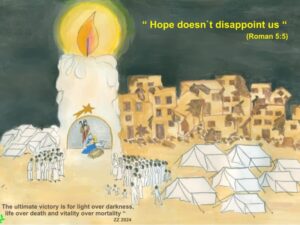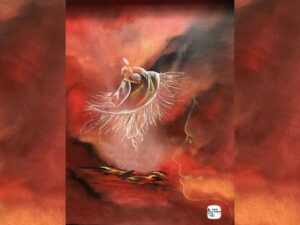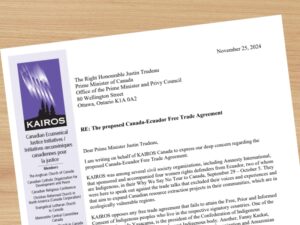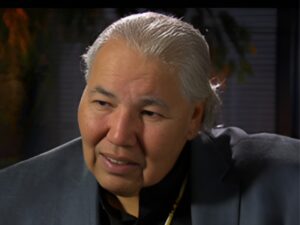KAIROS is enthusiastically supporting Ellen Gabriel’s participation at the 15th Session of the United Nations Permanent Forum on Indigenous Issues (UNPFII) in New York
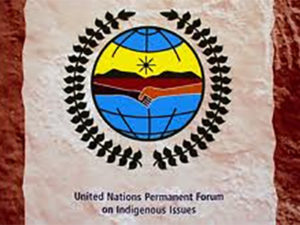
KAIROS is enthusiastically supporting Ellen Gabriel’s participation at the 15th Session of the United Nations Permanent Forum on Indigenous Issues (UNPFII) in New York. She will be addressing issues of language and culture.
Language and culture are inextricable pillars of Indigenous identity. They are an integral form of resilience against racial and institutionalized discrimination. Each year, as the number of Indigenous language speakers decreases, there is an increased loss of traditional knowledge and genuinely Indigenous perspectives.
The information necessary for regenerating languages is easily accessible, and the reports and recommendations made by various human rights bodies highlight the crucial need for states to protect and promote Indigenous languages.
In order to rebuild Indigenous language and culture in innovative ways, Indigenous peoples in Canada need to have control of their education, financial support, and the ability to ensure that all available speakers and holders of culture and knowledge are able to work towards cultural rejuvenation. This is what reconciliation looks like.
Look forward with us to Ellen’s updates from the UNPFII, coming this week!
Ellen Gabriel was well-known to the public when she was chosen by the People of the Longhouse and her community of Kanehsatà:ke to be their spokesperson during the 1990 “Oka” Crisis; to protect the Pines from the expansion of a 9 hole golf course in “Oka” and the removal of Kanien’kehá:ka ancestors from their burial grounds.
Since the Occupation of Kanehsatà:ke in 1990 Ms. Gabriel has been active as an Indigenous human rights activist and has been steadily advocating for the human rights of Indigenous peoples. She has worked diligently to sensitize the public, academics, policing authorities and politicians on the history, culture and identity of Indigenous peoples.
She has made numerous public presentations on Indigenous rights and history, including presentations to Parliamentary committees and the National Assembly on legislative amendments affecting the rights of Aboriginal peoples in Canada.
She has been active at the international level participating at the United Nations Permanent Forum on Indigenous issues, participating in the negotiations on the Nagoya Protocol of the Convention on Biodiversity and at the UN Expert Mechanism on the Rights of Indigenous Peoples.
She has traveled across Canada, to the Hague in Holland, Strasbourg, France to address the European parliament, and to Japan to educate people about the events in her community during the 1990 “Oka Crisis” when she was chosen by the Longhouse and her community to be their spokesperson.
Ms. Gabriel has a Bachelor of Fine Arts degree from Concordia University where she graduated in May 1990. She worked as an Illustrator/Curriculum developer for Tsi Ronteriwanónha ne Kanien’kéka/ Kanehsatà:ke Resource Center in Kanehsatà:ke and also worked as an Art Teacher for the Mohawk Immersion School for grades 1-6. Ellen has also worked on videos illustrating legends of the Iroquois people and the local community stories. She is presently an active board member of Kontinónstats – Mohawk Language Custodians and First Peoples Human Rights Coalition.
In 2004, Ellen Gabriel was elected president of the Quebec Native Women’s Association a position which she held for 6 ½ years, until December 2010.
Awards: In 2005 Ms. Gabriel received the Golden Eagle Award from the Native Women’s Association of Canada; 2008 International Women’s Day Award from the Barreau du Québec/Québec Bar Association, and as well in August 2008 Ms. Gabriel was the recipient of the Indigenous Women’s Initiative “Jigonsaseh Women of Peace Award” for her advocacy work.
She believes that decolonization will be achieved by implementing the United Nations Declaration on the Rights of Indigenous Peoples with the full and effective participation of Indigenous peoples. She believes that education controlled by Onkwehón:we (Indigenous peoples) based upon our languages and culture are paramount to the revitalization of our institutions damaged by the Indian Act, the Indian Residential School ; as well as, colonial legislation and policy. Our traditional knowledge of the land, medicines and ceremonies are precious as they are some of the pillars of Indigenous peoples identity to help overcome colonial oppression. She is an advocate for gender equity, the revitalization of Indigenous languages, culture, traditional knowledge and Indigenous governing structures.









